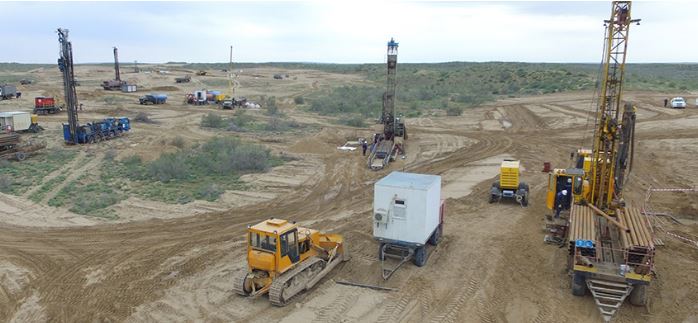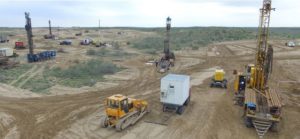Kazakh uranium giant poised to list shares in London

A Kazatomprom uranium operation. Source: National Atomic Company Kazatomprom JSC.

National Atomic Co. Kazatomprom JSC, the world’s largest uranium producer, has secured investor support to list 15% of its shares in London this month, sources have told the Financial Times of London.
The Kazakh company is aiming to raise up to US$600 million in the listing, which would value the uranium producer at US$4 billion.
One industry official said the planned listing could give a boost to uranium prices, which have gained about 30% since April 2018, to trade at around US$28 a pound, but are still a long way from US$72.63, the level reached before the 2011 Fukushima disaster in Japan, a pivotal event that triggered a lengthy bear market in the uranium sector.
Mark Chalmers, the President and CEO of Colorado-based Energy Fuels Inc. [EFR-TSX] recently told the Cambridge House International Silver Summit in San Francisco that Kazatomprom has focused on increasing market share in recent years.
But now that the company is going public, it will want the IPO to be underpinned by a higher uranium price. That could force it to reduce its production ahead of the IPO, Chalmers said. However, he said it’s possible that the IPO could be delayed.
Meanwhile, published reports say Japan’s domestic nuclear industry will miss a government target of providing at least one-fifth of the country’s electricity by 2030.
However, the sector is showing signs of life more than seven years after the Fukushima crisis, according to a Reuters report. With eight reactors running and one more set to come online this month, nuclear has this year overtaken non-hydro renewables in power output for the first time since the 2011 catastrophe, when all of the country’s nuclear plants were idled.
Reuters News service said Japan’s nuclear regulator has approved an operations extension for a 40-year-old reactor near Tokyo that was damaged in the same earthquake and Tsunami that sparked the Fukushima disaster.
The move is expected to be controversial. That’s because the reactor has the same basic design as those that melted down in the Fukushima crisis. It will be the first boiling water reactor to be approved for a lifetime extension of 20 years.
Meanwhile, industry officials in the U.S. are awaiting the outcome of a U.S. Department of Commerce investigation into the effects of uranium imports on U.S. national security. The investigation was launched on July 18, 2018 at the request of Energy Fuels and another U.S. company Ur-Energy Co. [URE-TSX].
Energy Fuels and Ur-Energy petitioned for the investigation amid concerns that domestic producers in the U.S. are projected to fulfill about 2% of total U.S. commercial demand in 2018. In 2017, imports of uranium from state-owned and state-subsidized enterprises in Russia, Kazakhstan and Uzbekistan fulfilled about one third of U.S. demand, while purchases of U.S. uranium by owners of U.S. nuclear reactors dropped by 46%.
In the petition, the companies proposed two complementary remedies. They include a quota that limits imports of uranium into the U.S., effectively reserving 25% of the U.S. market for domestic uranium production, as well as a requirement for U.S. federal utilities and agencies to buy U.S. uranium in accordance with the President’s Buy American Policy.
The proposed remedies are expected to result in U.S. utilities purchasing approximately 12 million pounds of uranium per year from U.S. production.
